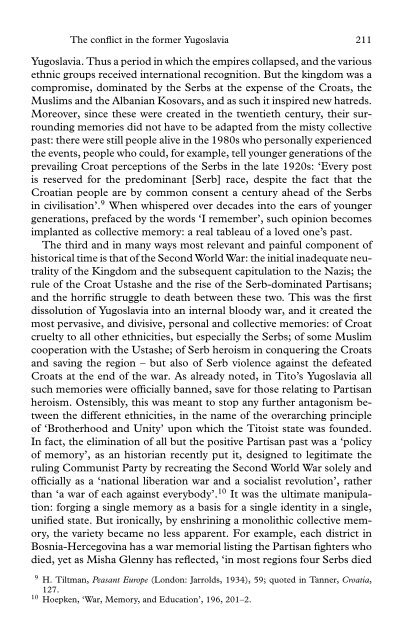Memory and Power in Post-War Europe: Studies in the Presence of ...
Memory and Power in Post-War Europe: Studies in the Presence of ...
Memory and Power in Post-War Europe: Studies in the Presence of ...
Create successful ePaper yourself
Turn your PDF publications into a flip-book with our unique Google optimized e-Paper software.
The conflict <strong>in</strong> <strong>the</strong> former Yugoslavia 211<br />
Yugoslavia. Thus a period <strong>in</strong> which <strong>the</strong> empires collapsed, <strong>and</strong> <strong>the</strong> various<br />
ethnic groups received <strong>in</strong>ternational recognition. But <strong>the</strong> k<strong>in</strong>gdom was a<br />
compromise, dom<strong>in</strong>ated by <strong>the</strong> Serbs at <strong>the</strong> expense <strong>of</strong> <strong>the</strong> Croats, <strong>the</strong><br />
Muslims <strong>and</strong> <strong>the</strong> Albanian Kosovars, <strong>and</strong> as such it <strong>in</strong>spired new hatreds.<br />
Moreover, s<strong>in</strong>ce <strong>the</strong>se were created <strong>in</strong> <strong>the</strong> twentieth century, <strong>the</strong>ir surround<strong>in</strong>g<br />
memories did not have to be adapted from <strong>the</strong> misty collective<br />
past: <strong>the</strong>re were still people alive <strong>in</strong> <strong>the</strong> 1980s who personally experienced<br />
<strong>the</strong> events, people who could, for example, tell younger generations <strong>of</strong> <strong>the</strong><br />
prevail<strong>in</strong>g Croat perceptions <strong>of</strong> <strong>the</strong> Serbs <strong>in</strong> <strong>the</strong> late 1920s: ‘Every post<br />
is reserved for <strong>the</strong> predom<strong>in</strong>ant [Serb] race, despite <strong>the</strong> fact that <strong>the</strong><br />
Croatian people are by common consent a century ahead <strong>of</strong> <strong>the</strong> Serbs<br />
<strong>in</strong> civilisation’. 9 When whispered over decades <strong>in</strong>to <strong>the</strong> ears <strong>of</strong> younger<br />
generations, prefaced by <strong>the</strong> words ‘I remember’, such op<strong>in</strong>ion becomes<br />
implanted as collective memory: a real tableau <strong>of</strong> a loved one’s past.<br />
The third <strong>and</strong> <strong>in</strong> many ways most relevant <strong>and</strong> pa<strong>in</strong>ful component <strong>of</strong><br />
historical time is that <strong>of</strong> <strong>the</strong> Second World <strong>War</strong>: <strong>the</strong> <strong>in</strong>itial <strong>in</strong>adequate neutrality<br />
<strong>of</strong> <strong>the</strong> K<strong>in</strong>gdom <strong>and</strong> <strong>the</strong> subsequent capitulation to <strong>the</strong> Nazis; <strong>the</strong><br />
rule <strong>of</strong> <strong>the</strong> Croat Ustashe <strong>and</strong> <strong>the</strong> rise <strong>of</strong> <strong>the</strong> Serb-dom<strong>in</strong>ated Partisans;<br />
<strong>and</strong> <strong>the</strong> horrific struggle to death between <strong>the</strong>se two. This was <strong>the</strong> first<br />
dissolution <strong>of</strong> Yugoslavia <strong>in</strong>to an <strong>in</strong>ternal bloody war, <strong>and</strong> it created <strong>the</strong><br />
most pervasive, <strong>and</strong> divisive, personal <strong>and</strong> collective memories: <strong>of</strong> Croat<br />
cruelty to all o<strong>the</strong>r ethnicities, but especially <strong>the</strong> Serbs; <strong>of</strong> some Muslim<br />
cooperation with <strong>the</strong> Ustashe; <strong>of</strong> Serb heroism <strong>in</strong> conquer<strong>in</strong>g <strong>the</strong> Croats<br />
<strong>and</strong> sav<strong>in</strong>g <strong>the</strong> region – but also <strong>of</strong> Serb violence aga<strong>in</strong>st <strong>the</strong> defeated<br />
Croats at <strong>the</strong> end <strong>of</strong> <strong>the</strong> war. As already noted, <strong>in</strong> Tito’s Yugoslavia all<br />
such memories were <strong>of</strong>ficially banned, save for those relat<strong>in</strong>g to Partisan<br />
heroism. Ostensibly, this was meant to stop any fur<strong>the</strong>r antagonism between<br />
<strong>the</strong> different ethnicities, <strong>in</strong> <strong>the</strong> name <strong>of</strong> <strong>the</strong> overarch<strong>in</strong>g pr<strong>in</strong>ciple<br />
<strong>of</strong> ‘Bro<strong>the</strong>rhood <strong>and</strong> Unity’ upon which <strong>the</strong> Titoist state was founded.<br />
In fact, <strong>the</strong> elim<strong>in</strong>ation <strong>of</strong> all but <strong>the</strong> positive Partisan past was a ‘policy<br />
<strong>of</strong> memory’, as an historian recently put it, designed to legitimate <strong>the</strong><br />
rul<strong>in</strong>g Communist Party by recreat<strong>in</strong>g <strong>the</strong> Second World <strong>War</strong> solely <strong>and</strong><br />
<strong>of</strong>ficially as a ‘national liberation war <strong>and</strong> a socialist revolution’, ra<strong>the</strong>r<br />
than ‘a war <strong>of</strong> each aga<strong>in</strong>st everybody’. 10 It was <strong>the</strong> ultimate manipulation:<br />
forg<strong>in</strong>g a s<strong>in</strong>gle memory as a basis for a s<strong>in</strong>gle identity <strong>in</strong> a s<strong>in</strong>gle,<br />
unified state. But ironically, by enshr<strong>in</strong><strong>in</strong>g a monolithic collective memory,<br />
<strong>the</strong> variety became no less apparent. For example, each district <strong>in</strong><br />
Bosnia-Hercegov<strong>in</strong>a has a war memorial list<strong>in</strong>g <strong>the</strong> Partisan fighters who<br />
died, yet as Misha Glenny has reflected, ‘<strong>in</strong> most regions four Serbs died<br />
9 H. Tiltman, Peasant <strong>Europe</strong> (London: Jarrolds, 1934), 59; quoted <strong>in</strong> Tanner, Croatia,<br />
127.<br />
10 Hoepken, ‘<strong>War</strong>, <strong>Memory</strong>, <strong>and</strong> Education’, 196, 201–2.
















